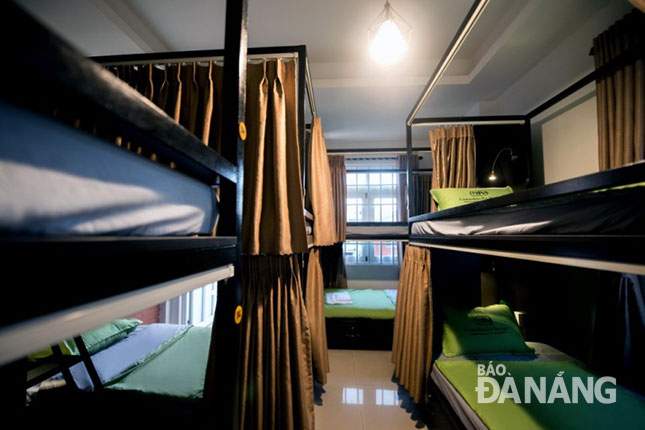Hostels and homestays boom in city
Over recent years, Da Nang has seen a growing number of visitors preferring to stay in homestays or hostel rooms rather than in luxury hotels or resorts. Thanks to this, there has been a boom in the number of nice hostels and homestays in the city.
 |
| A typical hostel room featuring bunk beds (Photo: Quynh Trang) |
By December last year, Da Nang had been home to a total of 50 hostels and 23 homestays, and the majority of them are located in the districts of Son Tra, Ngu Hanh Son and Hai Chau.
Hostels provide budget-oriented, sociable accommodation for visitors who are happy to sleep in a shared dorm room with others or sometimes have a private room. In particular, hostels are often cheaper for both the operator and occupants.
In reality, young travellers need to have good integration skills when staying at a hostel because they will share their living space, including sleeping rooms, bathrooms, toilets, and kitchens, with many other people.
Opened in August last year, the Pack’n Go, nestled in a small alley on Hung Vuong, is now a popular address with domestic and foreign travellers to the city, especially young backpackers.
The hostel owner, Mr Le Quoc Hung, said that he is very interested in backpacking travel, and he used to stay at many hostels around the world. Realising the increasing demand for hostel accommodation amongst backpackers, the man decided to open a hostel which is similar to those in Japan.
Like other hostels, Pack’n Go features bunk beds and other shared living spaces, including a lovely and cozy living room, plus a fully-equipped kitchen for its guests.
Staying in a local lovely hostel, a foreign visitor said, “I am very interested in staying at hostels during my vacation because of their reasonable prices and great convenience for my travel purpose. I am deeply impressed by the clean environment of Da Nang in comparison with that in other localities in Viet Nam and neighbouring countries”.
Like hostels, homestays have also become increasingly attractive to visitors, especially young ones, and there have been an increasing number of visitors choosing this type of service rather than luxury hotels or resorts.
 |
| A lovely space at local homestay gives guests a comfortable and close-to-nature feeling |
Most of the current homestays are operated by local residents, and their guests are mainly independent travellers.
The term ‘homestay’ is used to mean a local family hosting tourists in their homes for a few days or perhaps longer. It offers tourists an up-close opportunity to experience rustic life, and gain a better appreciation of the cultural differences between the lives of the visitors and the locals.
Ms Bui Nhung, the owner of the Hanigo Homestay Da Nang, said that love for this beautiful seaside city inspired this woman and her husband to settle down here and open a hostel.
She said that her foreign guests always show their keen interest in exploring the distinctive cultural values of the locality.
Da Nang is making every effort to diversify its tourism services and products, and to limit the impact of seasonality in tourism. Therefore, hostels and homestays are accommodation services very suitable for the city’s tourism development strategies.
Ms Le Thi Ai Diep, the Head of the Accommodation Management Office at the municipal Tourism Department, pointed out to the fact that the city is facing a shortage of specific operation regulations about hostels and homestays as well as an overlap in management activities.
In an attempt to address this matter, the Department recently asked for permission from the municipal government to empower district-level People’s Committees to conduct the State management of these types of accommodations.
Importance will be attached to issuing the city’s standards for these accommodation services to ensure the best quality for customers, and its effective management work.